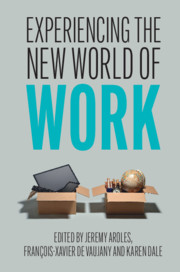
-
Select format
-
- Publisher:
- Cambridge University Press
- Publication date:
- December 2020
- January 2021
- ISBN:
- 9781108865814
- 9781108496070
- 9781108791090
- Dimensions:
- (229 x 152 mm)
- Weight & Pages:
- 0.55kg, 286 Pages
- Dimensions:
- (229 x 152 mm)
- Weight & Pages:
- 0.436kg, 286 Pages
- Subjects:
- Organisation Studies, Human Resource Management, Management
You may already have access via personal or institutional login- Subjects:
- Organisation Studies, Human Resource Management, Management
Book description
Exploring the different facets of the new world of work (including the hacker and maker movements, platform work, and digital nomadism), this edited volume sets out to investigate and theorise how these new work practices are experienced by various actors. It explores such changes at both the micro and macro levels and sets out to link them back to wider social, managerial and political issues. In doing so, it aims to reflect on the similarities and differences between new and 'old' work practices and problematize discourses surrounding the future of work. This volume is characterized by the diversity of methods mobilized, the plurality of concepts, lenses and theories deployed as well as the richness of the empirical accounts used by the authors. It will appeal to a broad readership of management and organizational scholars as well as sociologists interested in current changes to the world of work.
Reviews
Is there one future of work? This excellent volume shows that employment continues to be contested. For some, the the digital frontier of control has moved into the home or the delivery van. For others, the care home or field continues to be the site of low paid manual work. If you want a serious and evidence based analysis of current trends and future possibilities, then read this book.
Martin Parker - Professor of Organisation Studies, and Lead for the Bristol Inclusive Economy initiative,Department of Management, Bristol University
In an increasingly volatile, but also strangely predictable world, it is more important than ever that we remain academically alert to both the changes and continuities that characterise the experience of work. This rich and timely collection, focusing on the impact of contemporary workplace practices of – amongst others – embodiment, spatiality, and digitisation, makes a vital and accessible contribution to this endeavour.
Philip Hancock - Professor of Work and Organisation, Essex Business School, University of Essex
Why, asked the poet Philip Larkin, did he find the toad work squatting on his life? His answer was typically laconic: because inside himself, he observed, there was something toad like too, cold and heavy, always weighing on him. Work was its outward expression. Without the in-trays, regular hours, pension rights, class exploitation, and doleful routine he would be like those roaming or stumbling around the parks mid-afternoon with only empty chairs for friends. Within work, well, he was at least distracted from the inevitability of death. Nowadays, the toad has become a pond skater, neither heavy nor cold: it is elusive, nebulous, and humming with mediating technologies, and the empty chairs around the park bandstand have become workstations. It is in such a setting that the essays in this volume become incredibly timely. They give voice to a new, mobile cast of characters in the world of work: hackers, nomads, teleworkers, learning algorithms, makers, and platforms, in short a veritable commedia dell arte for our technologically mediated times. We learn how working humans are being joined by (better?) working non-humans, how exploitation has become a lifestyle choice – or intensified by poverty and confined invisibly to the peripheral spaces of the globe – and how, if there is any meaning to be found in such fluid, often exaggerated, and transitory experiences, it comes doused in irony. The field of study that is still, rather quaintly, called human relations needs completely uprooting. This volume makes an admirable foray into this radical work.
Robin Holt - Professor, Department of Management, Politics and Philosophy, Copenhagen Business School
Contents
Metrics
Altmetric attention score
Full text views
Full text views help Loading metrics...
Loading metrics...
* Views captured on Cambridge Core between #date#. This data will be updated every 24 hours.
Usage data cannot currently be displayed.
Accessibility standard: Unknown
Why this information is here
This section outlines the accessibility features of this content - including support for screen readers, full keyboard navigation and high-contrast display options. This may not be relevant for you.
Accessibility Information
Accessibility compliance for the PDF of this book is currently unknown and may be updated in the future.


